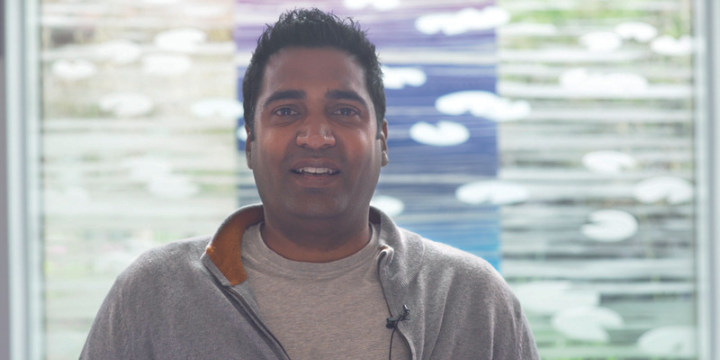Dr Rishma Pau is a consultant in palliative medicine at Martlets and was a key member of the clinical team looking after Gordon, a patient with Motor Neurone Disease (MND). Gordon received care at home and on our inpatient unit.
“I first met Gordon just after I’d started working at Martlets. I was shadowing one of the Martlets doctors who was running an outpatient’s clinic, as part of my induction. The first thing he said to me was “I bet you didn’t realise I was a patient when I walked in!” He had so much energy and presence and was really funny. He had such a love for life.
The next time he came into the Hospice though, Gordon was in a much more vulnerable place. He was thinking about his quality of life as the MND progressed and the reality of what was happening, and he was very low. We had some really big conversations about his life and about his plans for the end of his life.
It was the height of the pandemic and there were some potential challenges in how we were going to communicate with each other. I had to wear full PPE including a mask and he had lost the use of his voice due to the progression of the illness. Yet what struck me was how well he was able to communicate despite this. He had a voice programme on his mobile phone which meant we could have the big conversations.
He was a very honest person and was very accepting of the circumstances and we all appreciated how open he was with us as a staff team.
Gordon never let the loss of his voice become a barrier as he loved to communicate, and you could sit and talk to him at length. He was determined not to let that slip away.
From the start, it was so important to get to know his family too – his mum Paula, and his wife, sister, and children. We talked to them regularly in person and on the phone to check in. He was making some major decisions about treatment and about what he wanted at the end, and it was important to engage with the whole family on this. It was really evident how much his family meant to him, and how much he wanted us to engage with his loved ones. He knew how difficult it would be for them when he was gone, and he wanted to know that we would be there for them.
There was something so powerful in his courage and honesty and it was a real privilege to use our clinical expertise to support him in making the most of the time he had. As well as heavy conversations, there were so many laughs too.
I remember one day I came into his room on the inpatient unit and there were glow sticks and streamers all over his bed and side table. He had this grin and said, “Oh yeah, we had a bit of a rave in here last night.” It was such a challenging time looking after our patients during the pandemic and things were so emotionally heavy, yet we were still able to offer our Martlets fun times and balance those darker periods with lightness and laughter.
As well as symptom management, a lot of the support we gave was emotional. We needed to control Gordon’s physical symptoms, but also to support him in finding a way through his psychological issues and to think holistically about his care. We needed to understand all of the things that had meaning in his life and make sure we did our best to help him enjoy those things for as long as possible.
Gordon was a Buddhist and had been attending the Buddhist temple in Midhurst. He was able to go there one last time with help from his mum Paula. It was so important to make sure he was able to do these contemplative things that meant a lot to him towards the end of his life.
For Gordon, and for many other patients, we became their support network during the pandemic because their loved ones couldn’t visit in the same way due to the national restrictions. We became a bit of a surrogate family for patients and for each other on the staff team.
My colleagues also developed a deep connection with Gordon during this time because he let people in; he allowed himself to be vulnerable with us. What we aim for is to give people quality of life for as long as possible. And I really think we were able to do that for Gordon.
Although this was an emotional time for all involved, there was also a sense of calm knowing that he was peaceful at the end and that meant a lot.”
Be a part of our moving story and support even more local families in your local community today.
Published 24/07/2023

